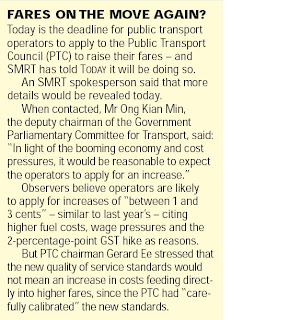COMMUTERS may soon have a shorter waiting time for buses during peak hours.
The Public Transport Council (PTC) will be further tightening the quality of service (QoS) standards for basic bus services operated by SBS Transit and SMRT Buses.
The PTC has required that the operators have at least 80 per cent of their bus services operating at frequencies of not more than 10 minutes during weekday peak hours.
At present, the interval is 15 minutes.
'The PTC decided that the current service provision standard of 15 minutes for peak period can be reduced further. This is long when we factor in the 5 minute allowance for operational deviation in the actual schedule,' PTC chairman Gerard Ee said.
'On the ground, this could translate to waiting times of 20 minutes or more for some commuters.'
The operators will be given two years to comply with the revised standard, meaning that it will take effect from August 2009.
This will give the operators enough time 'to progressively procure more buses and recruit and train more drivers in order to meet this requirement', the PTC said.
Timetables, bus load
Another new requirement PTC stated was for timetables of bus services that have a frequency of 20 minutes or more to be displayed at bus stops, effective from August this year.
This applies to services where more than 20 per cent of the bus trips fall outside this interval.
Currently, operators need to do so only for bus services with more than 20 per cent of the bus trips having frequencies that exceed 20 minutes.
Also, PTC stated that bus loading during weekday peak periods on each bus service should not exceed 95 per cent daily. This means buses should not be overcrowded even during peak periods.
With effect from October, the bus operators will also be fined if they fail to meet the QoS standards.
Depending on the standards, the penalty ranges from $100 per day per bus service to $10,000 per month per standard.
How about your opinion? Do you think this is good idea ? Does it will cause increasing bus fares?










